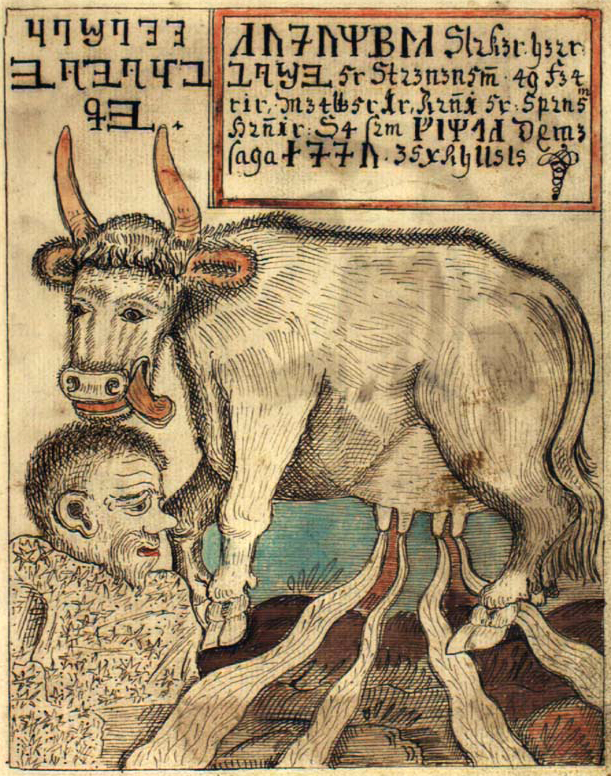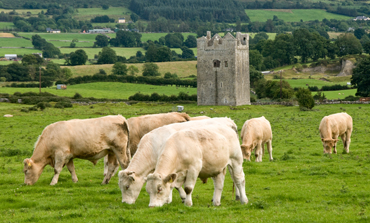
History of Irish Cattle Culture
For hundreds of years cattle have been extremely import in Ireland. In the middle ages and before cows were not only important as a source of food, meat and milk, but as currency and had significant economic and political influence. In this time the social and political importance of a person was evaluated based on how many cows their life was worth.² As the basic unit of wealth, cows were often used in most monetary interactions including fines, tribute and marriage presentations.¹ As might be expected cattle raids were extremely common but were not really considered crimes but rather demonstrations of social and political strength and become part of the folklore tradition. Tain bo Cuailnge, for example, is an epic tale of a queen traveling far and wide to find a prized cow to fight the kings prized cow and prove her superiority. However when the English began to assert there influence over the Irish they viewed this tradition of raiding as highly uncivilized and barbaric. English men like Edmund Spencer looked upon the Irish as a “degenerate race of cattle thieves and robbers,” and felt that they needed to put fences all around the Irish land scape to stop such savage behavior. Following plantation cows remained an important part of rural agriculture but were rarely a part of the poor farmers diet. Even in the years of the famine when many people were starving, cows were better left alive as a source of milk or export.

Modern Irish Cattle
Still today, though one can find organizations with great pride in Irish breads of cattle, such as the Irish Angus Society, very little Irish cattle is consumed in Ireland. A survey conducted in 2013 estimated that there are 6.6 million cattle in Ireland and that 110,000 of the the 139,000 farms in Ireland have some cattle. But even though beef makes up a significant portion of the agricultural economy cattle farmers earn very little and many hold supplementary jobs off the farm. In fact 92% of the beef produced in Ireland is exported. These statistic suggest that despite the historic cultural significance and the urban emphasis on “Irish Beef” there is little cultural influence in rural societies. Cows do not provide farmers with significant enough income and the large percent of exports suggest “Irish” beef is not exceedingly important to rural food culture.³

The Transition
In urban food establishment like Thornton’s there is a emphasis on Irish beef and its importance to the rural culture of Ireland, but a closer examination of cattle farming doesn’t entirely reflect that. In fact the urban cultures emphasis on beef seems to align more with a very historical notion of cattle significance than a modern one were most of the Irish beef is not actually consumed in Ireland. And though some of the breeds are unique to Ireland there is nothing particularly distinct about raising cows, its done all around the world. Urban food culture therefor must transform beef to make it even more distinctly Irish by feeding cows Guinness and letting them rest on peat. This transition illuminates a small example, of lingering nationalism and of urban Irishman’s slightly fantastic views of Ireland and their desire to remain tied to the land.
1)McCormick, Finbar. The Decline of the Cow: Agricultural and Settlement Change in Early Medieval Ireland. 2008. https://www.qub.ac.uk/schools/gap/Staff/FileStore/Filetoupload,287072,en.pdf
2) Sherwood, Amy. An Bo Bheannaithe: Cattle Symbolism in Traditional Irish Folklore, Myth, and Archaeology. McNair Online Journal.
3) The Importance of Cattle and Sheep Sectors to the Irish Economy. Irish Farmers Association. 2013.
4) Jenkins, Raymond. “Spencer on Ireland.” The John Hopkins University Press. 2011. https://docs.google.com/file/d/0B-5-JeCa2Z7hZjQxZWM1YTktNGE4OC00NjY5LThkNmYtMWQ1Nzk2Y2U5YTk1/edit?hl=en

One Reply to “Rural Beef and Transformation”